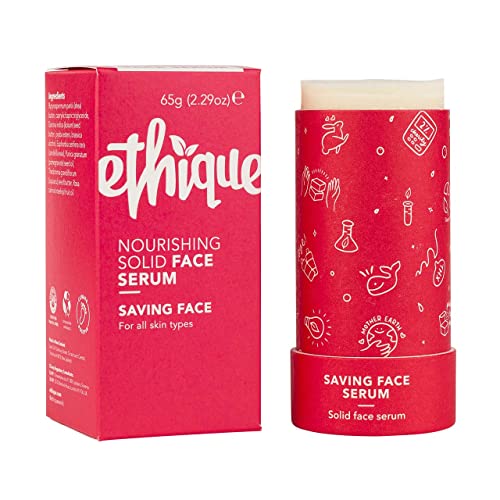
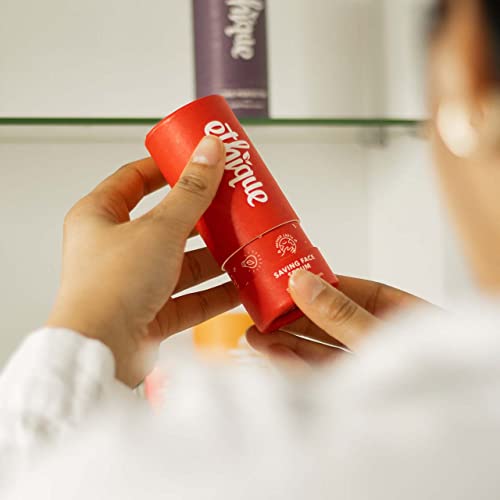
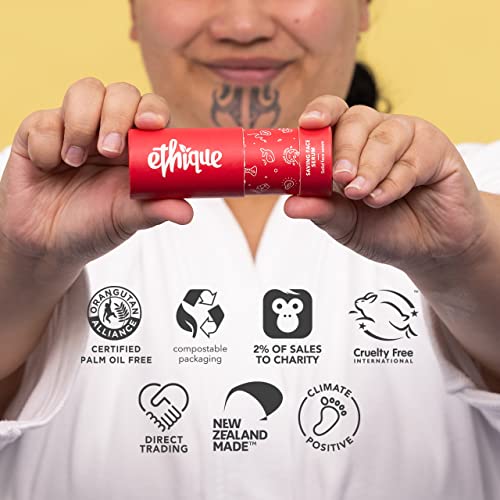
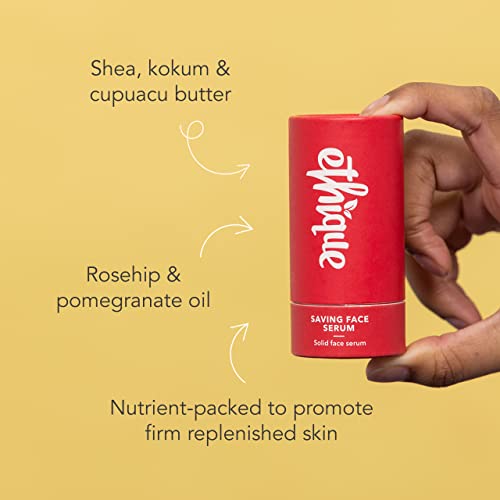
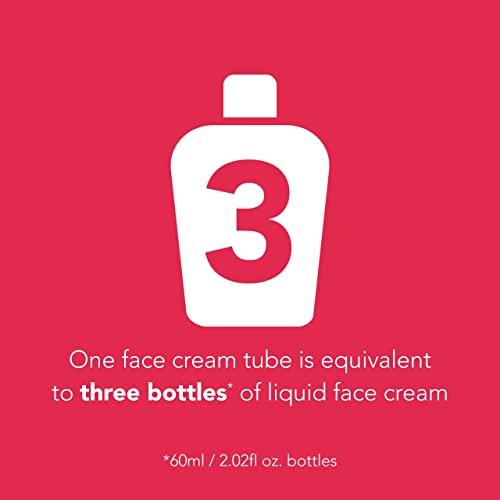
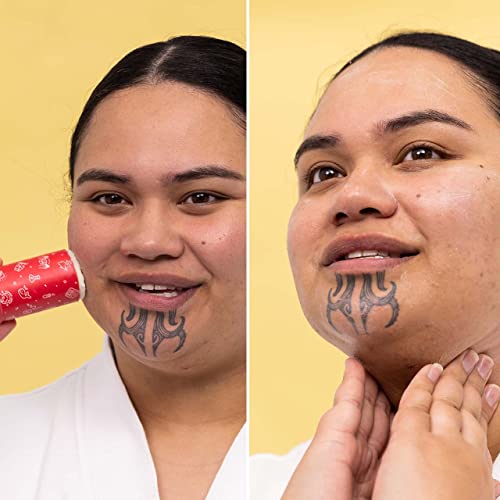
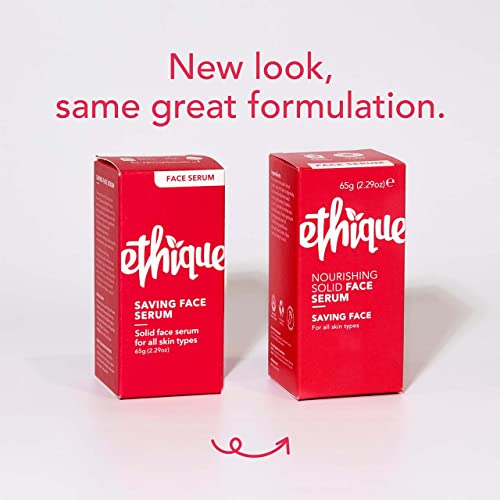
Ethique Face Serum - Nourishing Hydration with Antioxidants, Vegan & Cruelty-Free - 2.29 oz


Butyrospermum Parkii (Shea) Butter
Low RiskButyrospermum parkii (shea) butter is a vegetable fat derived from the nuts of the shea tree. It is commonly used in cosmetic formulations for its emollient properties, providing moisture and improving skin texture. Additionally, shea butter is known for its ability to enhance the stability of products and deliver a creamy texture.
Sustai Insights
Shea butter offers functional benefits as an effective moisturizer, enhancing skin barrier function and texture. It is sustainably sourced and biodegradable, contributing to eco-friendliness. Health-wise, it is associated with low risks for carcinogenicity, allergies, and reproductive toxicity. Environmental impacts are minimal, with no significant pollutant potential identified. Regulatory assessments indicate no current restrictions. Overall, the ingredient presents a low risk, making it a favorable choice in cosmetic formulations.
Brassica Alcohol
Low RiskBrassica alcohol is a fatty alcohol derived from the seeds of Brassica plants, commonly used in cosmetic formulations as an emollient and surfactant. It helps to enhance texture and stability, providing a smooth application in various personal care products.
Sustai Insights
Brassica alcohol offers functional benefits as an emollient and stabilizer, with low associated health risks such as carcinogenicity, allergies, or reproductive toxicity. Environmentally, it poses minimal hazards, being neither a pollutant nor bioaccumulative. Regulatory status indicates no current restrictions. Overall, it is considered low risk, with safe usage practices encouraged. Alternatives may include other fatty alcohols, depending on formulation requirements.
Caprylic Triglyceride
Low RiskCaprylic triglyceride is an ester derived from coconut oil and glycerin, commonly used in cosmetic formulations as an emollient, stabilizer, and skin-conditioning agent. It helps to improve the texture and spreadability of products while providing a lightweight, non-greasy feel.
Sustai Insights
Caprylic triglyceride offers functional benefits such as enhanced skin moisturization and improved formulation stability. It is generally regarded as safe, with low concerns regarding carcinogenicity, allergenic potential, and reproductive toxicity. Environmental impact is minimal, with no significant pollutant or bioaccumulative properties identified. Regulatory bodies have not issued warnings or restrictions. Overall, the risk level is low, making it a suitable ingredient in cosmetic products. Safe usage practices include adhering to recommended concentrations, and while there are alternatives, caprylic triglyceride remains a reliable choice.
Euphorbia Cerifera (Candelilla) Wax
Low RiskCandelilla wax is extracted from Euphorbia cerifera, a shrub native to northern Mexico and the southwestern United States. It is primarily used as a thickening agent, emollient, and film-forming agent in cosmetic and personal care products.
Sustai Insights
Candelilla wax serves effectively as a natural thickener and emollient, contributing to product texture and moisture retention. It is biodegradable and sourced sustainably, supporting eco-friendly formulations. Health risks are low, with minimal concerns about sensitization. Environmental hazards are also low, with no significant pollutant or bioaccumulation potential noted. Regulatory bodies impose few restrictions, indicating overall low risk. Safe usage practices should be followed, and alternatives like carnauba wax may be considered for those seeking different plant-based options.
Jojoba Esters
Low RiskJojoba esters are a complex mixture of esters produced from the oil of the jojoba plant (Simmondsia chinensis). They serve primarily as emollients and skin conditioning agents in cosmetic formulations, enhancing texture and moisture retention.
Sustai Insights
Jojoba esters provide effective moisturizing properties, contributing to skin conditioning and improving product feel. They are sustainably sourced and biodegradable, posing low risk for carcinogenicity, allergies, and developmental toxicity. Environmental risks are minimal, with no significant pollutants or bioaccumulation concerns. Regulatory agencies have not imposed restrictions, indicating a low overall risk assessment. Safe usage practices should include monitoring for any allergic reactions, although such occurrences are rare. Alternatives, such as synthetic emollients, may be considered, but jojoba esters remain a low-risk option.
Punica Granatum (Pomegranate) Seed Oil
Low RiskPunica granatum (pomegranate) seed oil is derived from the seeds of the pomegranate fruit. It serves primarily as a moisturizer and emollient in cosmetic formulations, contributing to skin hydration and texture improvement. The oil is rich in fatty acids and antioxidants, enhancing its functional properties in personal care products.
Sustai Insights
Punica granatum (pomegranate) seed oil offers functional benefits as a moisturizer and potential antioxidant. It is generally considered low risk for cancer, allergies, and reproductive toxicity, while contamination concerns are noted as low to moderate. Regulatory assessments do not impose significant restrictions on its use. Environmental impacts are minimal, and it is not classified as bioaccumulative. Safe usage practices are recommended, and alternatives may include other plant-based oils. Overall, the ingredient is assessed as low risk based on current scientific consensus.
Butyrospermum Parkii (Shea) Butter
Low RiskButyrospermum parkii (shea) butter is a vegetable fat derived from the nuts of the shea tree. It is commonly used in cosmetic formulations for its emollient properties, providing moisture and improving skin texture. Additionally, shea butter is known for its ability to enhance the stability of products and deliver a creamy texture.
Sustai Insights
Shea butter offers functional benefits as an effective moisturizer, enhancing skin barrier function and texture. It is sustainably sourced and biodegradable, contributing to eco-friendliness. Health-wise, it is associated with low risks for carcinogenicity, allergies, and reproductive toxicity. Environmental impacts are minimal, with no significant pollutant potential identified. Regulatory assessments indicate no current restrictions. Overall, the ingredient presents a low risk, making it a favorable choice in cosmetic formulations.
Brassica Alcohol
Low RiskBrassica alcohol is a fatty alcohol derived from the seeds of Brassica plants, commonly used in cosmetic formulations as an emollient and surfactant. It helps to enhance texture and stability, providing a smooth application in various personal care products.
Sustai Insights
Brassica alcohol offers functional benefits as an emollient and stabilizer, with low associated health risks such as carcinogenicity, allergies, or reproductive toxicity. Environmentally, it poses minimal hazards, being neither a pollutant nor bioaccumulative. Regulatory status indicates no current restrictions. Overall, it is considered low risk, with safe usage practices encouraged. Alternatives may include other fatty alcohols, depending on formulation requirements.
Caprylic Triglyceride
Low RiskCaprylic triglyceride is an ester derived from coconut oil and glycerin, commonly used in cosmetic formulations as an emollient, stabilizer, and skin-conditioning agent. It helps to improve the texture and spreadability of products while providing a lightweight, non-greasy feel.
Sustai Insights
Caprylic triglyceride offers functional benefits such as enhanced skin moisturization and improved formulation stability. It is generally regarded as safe, with low concerns regarding carcinogenicity, allergenic potential, and reproductive toxicity. Environmental impact is minimal, with no significant pollutant or bioaccumulative properties identified. Regulatory bodies have not issued warnings or restrictions. Overall, the risk level is low, making it a suitable ingredient in cosmetic products. Safe usage practices include adhering to recommended concentrations, and while there are alternatives, caprylic triglyceride remains a reliable choice.
Euphorbia Cerifera (Candelilla) Wax
Low RiskCandelilla wax is extracted from Euphorbia cerifera, a shrub native to northern Mexico and the southwestern United States. It is primarily used as a thickening agent, emollient, and film-forming agent in cosmetic and personal care products.
Sustai Insights
Candelilla wax serves effectively as a natural thickener and emollient, contributing to product texture and moisture retention. It is biodegradable and sourced sustainably, supporting eco-friendly formulations. Health risks are low, with minimal concerns about sensitization. Environmental hazards are also low, with no significant pollutant or bioaccumulation potential noted. Regulatory bodies impose few restrictions, indicating overall low risk. Safe usage practices should be followed, and alternatives like carnauba wax may be considered for those seeking different plant-based options.
Jojoba Esters
Low RiskJojoba esters are a complex mixture of esters produced from the oil of the jojoba plant (Simmondsia chinensis). They serve primarily as emollients and skin conditioning agents in cosmetic formulations, enhancing texture and moisture retention.
Sustai Insights
Jojoba esters provide effective moisturizing properties, contributing to skin conditioning and improving product feel. They are sustainably sourced and biodegradable, posing low risk for carcinogenicity, allergies, and developmental toxicity. Environmental risks are minimal, with no significant pollutants or bioaccumulation concerns. Regulatory agencies have not imposed restrictions, indicating a low overall risk assessment. Safe usage practices should include monitoring for any allergic reactions, although such occurrences are rare. Alternatives, such as synthetic emollients, may be considered, but jojoba esters remain a low-risk option.
Punica Granatum (Pomegranate) Seed Oil
Low RiskPunica granatum (pomegranate) seed oil is derived from the seeds of the pomegranate fruit. It serves primarily as a moisturizer and emollient in cosmetic formulations, contributing to skin hydration and texture improvement. The oil is rich in fatty acids and antioxidants, enhancing its functional properties in personal care products.
Sustai Insights
Punica granatum (pomegranate) seed oil offers functional benefits as a moisturizer and potential antioxidant. It is generally considered low risk for cancer, allergies, and reproductive toxicity, while contamination concerns are noted as low to moderate. Regulatory assessments do not impose significant restrictions on its use. Environmental impacts are minimal, and it is not classified as bioaccumulative. Safe usage practices are recommended, and alternatives may include other plant-based oils. Overall, the ingredient is assessed as low risk based on current scientific consensus.
Experience the pure luxury of Ethique's Saving Face Nourishing Solid Face Serum, designed for all skin types. This eco-friendly, plastic-free serum combines natural ingredients like cupuacu, shea, and rosehip oils, delivering deep hydration and promoting firm, radiant skin.
- Nutrient-Dense Formula: Rich in antioxidants and fatty acids, this serum nourishes and hydrates, helping maintain skin elasticity.
- Versatile Use: Ideal for normal to dry skin, it can be used as a standalone moisturizer or in conjunction with your favorite skincare routine.
- Environmentally Friendly: Packaged in a sustainable tube, it supports Ethique’s mission to eliminate plastic waste, making it a conscious choice for eco-minded consumers.
- Gentle and Safe: pH balanced and soap-free, perfect for all skin types, including oily and sensitive skin.
- Ethically Sourced Ingredients: Made from fair-trade, ethically sourced components, ensuring that every purchase supports sustainable practices.
Transform your skincare routine with this luxurious, eco-conscious face serum that cares for both your skin and the planet.
Subscribe & Save with Sustai
- Best Price Guarantee: Always enjoy the lowest prices on sustainable home essentials.
- No Surprises: We’ll notify you before shipping. No hidden fees, ever.
- You’re in Charge: Change, pause, or cancel your subscription anytime with ease.
- Eco-Friendly Deliveries: Our grouped shipments mean less packaging and lower emissions.
Join us on a sustainable journey. Special offers for a limited time! Prices and promotions may change.
Recommended Products
Experience the pure luxury of Ethique's Saving Face Nourishing Solid Face Serum, designed for all skin types. This eco-friendly, plastic-free serum combines natural ingredients like cupuacu, shea, and rosehip oils, delivering deep hydration and promoting firm, radiant skin.
- Nutrient-Dense Formula: Rich in antioxidants and fatty acids, this serum nourishes and hydrates, helping maintain skin elasticity.
- Versatile Use: Ideal for normal to dry skin, it can be used as a standalone moisturizer or in conjunction with your favorite skincare routine.
- Environmentally Friendly: Packaged in a sustainable tube, it supports Ethique’s mission to eliminate plastic waste, making it a conscious choice for eco-minded consumers.
- Gentle and Safe: pH balanced and soap-free, perfect for all skin types, including oily and sensitive skin.
- Ethically Sourced Ingredients: Made from fair-trade, ethically sourced components, ensuring that every purchase supports sustainable practices.
Transform your skincare routine with this luxurious, eco-conscious face serum that cares for both your skin and the planet.

You can have at most 2 Sustainable Steals products in your cart
Customer Reviews
Customers’ View
Customers appreciate the moisturizing properties of Ethique's Saving Face Serum, noting that it effectively hydrates and leaves skin feeling smooth. Many users describe it as long-lasting and beneficial for normal to dry skin. However, there are concerns regarding the product's smell, with several customers reporting an unpleasant odor. Additionally, some users have found the serum challenging to apply due to its hardness and stickiness, which can lead to dragging on the skin. Despite these drawbacks, the serum's eco-friendly formulation and commitment to sustainable practices resonate with environmentally conscious consumers, highlighting its value as a cruelty-free and plastic-free option. Overall, while the product has notable strengths, potential buyers should consider both the positive feedback and reported areas for improvement.
AI-generated from the text of customer reviewsThis product is rated 4.0 of 5.0 stars.
It has received 1 review.




